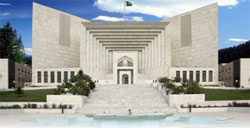PAKISTAN: The judiciary must confront suspected state agents on the issue of disappearances
It may have a recently-restored judiciary and an elected government that claims a strong interest in the rule of law, but Pakistan is seeing little progress in the hundreds of missing persons cases still pending. Pakistanis continue to be regularly ‘disappeared’ after arrest.
 With the police force exposed as increasingly negligent and corrupt, the responsibility of identifying such cases and intervening has long fallen to the judiciary. Judges taking suo moto action have secured the rescue of numerous persons from illegal military detention in the recent past, and this is widely believed to have been a major motive behind the sacking of the Supreme Court judges in 2007 by then-President and Army Chief, Pervez Musharraf. Yet despite the restoration of the Judiciary with its Chief Justice Iftikhar Chaudhry in March after a long civil struggle and with the support of current Chief of Army Staff General Kiyani, there has been a marked decline in the response from the courts to appeals from the family of the missing. Leading figureheads in the lawyers’ movement, such as Mr. Ali Ahmed Kurd, former president of Supreme Court Bar Association, have been renewing their criticism of its performance. The change has been raising questions about the courts allegiance to civil society versus its sense of obligation to his supporters in the army.
With the police force exposed as increasingly negligent and corrupt, the responsibility of identifying such cases and intervening has long fallen to the judiciary. Judges taking suo moto action have secured the rescue of numerous persons from illegal military detention in the recent past, and this is widely believed to have been a major motive behind the sacking of the Supreme Court judges in 2007 by then-President and Army Chief, Pervez Musharraf. Yet despite the restoration of the Judiciary with its Chief Justice Iftikhar Chaudhry in March after a long civil struggle and with the support of current Chief of Army Staff General Kiyani, there has been a marked decline in the response from the courts to appeals from the family of the missing. Leading figureheads in the lawyers’ movement, such as Mr. Ali Ahmed Kurd, former president of Supreme Court Bar Association, have been renewing their criticism of its performance. The change has been raising questions about the courts allegiance to civil society versus its sense of obligation to his supporters in the army.
In response to this institutional indifference, family members of the missing have taken to camping outside the Supreme Court complex in protest. The court recently relented to one group, stationed there from 2 to 17 November, and assured them that the fate of their loved ones would be examined and their cases tried. But the judges involved have since done little more than make clichéd remarks about the ultimate good of the Supreme Court, while showing no willingness to flex the judicial muscle; suspected perpetrators from the state agencies have not been called or held to account. The proceedings are, in fact, starting to resemble a publicity stunt.
Over the past few years the court has heard from various persons who were arrested illegally by intelligence agents and who were tortured in covert military torture cells for months at a time; more than enough to paint a convincing picture. On this basis alone, as people continue to vanish after arrest, the court is obliged to pursue the issue to the very extent of its ability.
The most prominent case of state abduction is that of three political activists from the Balochistan province who were kidnapped on April 3; they were taken from a lawyers office by plain clothed officials in one of the state’s conspicuous white vans. Their bodies were found six days later (http://www.ahrchk.net/ua/mainfile.php/2009/3145/). The lawyer and other eye witnesses are willing to testify, but the courts are not looking into the case. The most recent case brought to our attention is the struggle of a couple in Punjab to ensure a credible investigation into the disappearance of their son, who vanished during a hospital transfer under the custody of police (http://www.ahrchk.net/ua/mainfile.php/2009/3306/).
NGOs have estimated that during the current civilian government around 100 persons have gone missing after their arrest, and efforts to uncover their fate have mostly led nowhere. Political groups in Balochistan have reported that out of the 4,000 supposedly arrested there, not more than 200 have been brought to trial in courts and the remainder are unaccounted for, out of the reach of their relatives or lawyers. The Supreme Court itself has more than 400 cases of disappeared persons pending. Though statistics may vary, the size of the problem is beyond dispute.
Enforced disappearances thrive in societies with ill-functioning, dependent judiciaries, which fail to hold state agents accountable for their actions. Under autocratic governments and military regimes a nation’s judges become markedly subordinate, and these are the issues Pakistan continues to struggle with in the wake of Pervez Musharraf. A much stronger political will is required to forge a fresh start. This year Pakistan’s judiciary was restored by the loyalty of the masses, and the laudably steadfast determination of the Chief Justice Chaudhry and his colleagues to rescue the independence of the judiciary. Today its handling of disappearances must reflect this. Civil society needs to see that its judges are not afraid to summon state agents before the law and hold them accountable for their crimes.



